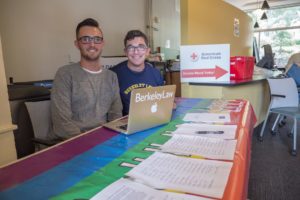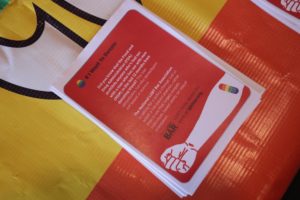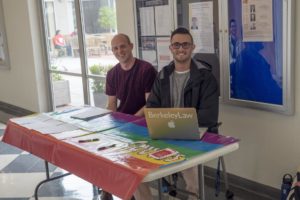On April 5, law students Taylor Horn, David Nahmias, and Tyler Wolfe tabled to raise awareness of the Food and Drug Administration’s (FDA) discriminatory ‘Gay Blood Ban’ at Berkeley Law’s first annual blood drive.

The law students at Berkeley wrote the letter featured below and circulated it to all the faculty, staff, and students at Berkeley Law before the blood drive started. During the drive, they peacefully protested the FDA’s discriminatory policy for six hours by handing out flyers and copies of the LGBT Bar’s student toolkit as well as asking donors to sign a petition for the FDA to move away from the “Gay Blood Ban” and to a risk-based assessment of donors. The petition was signed by 87 participants and their presence was welcomed at the drive. Tyler Wolfe, one of the protestors and co-chair of the LGBT Bar’s Law Student Congress, notes “the American Red Cross was extremely accommodating. They even allowed us to peacefully protest the ‘Gay Blood Ban’ from within the blood drive. We had our table set up directly next to the blood drive’s sign-in table. This visibility helped boost our message, and we are very grateful that the blood drive volunteers were so willing to work with us.”
Their protest was part of a larger campaign the LGBT Bar launched this summer that advocates for the FDA to adopt a risk-based analysis determined by the behavior of a donor rather than by their sexual orientation. Currently, men who have sex with men (MSM) are banned from donating blood purely due to their sexual orientation rather than a pattern of behavior that more accurately indicates their level of risk for HIV. The Berkeley Law students’ protest aimed to raise awareness of the fact that blood collection agencies could be far more effective at ensuring blood samples are HIV-free, and far less discriminatory, by implementing an individual risk assessment. Under this system, blood collection agencies would defer individuals based on risky behavior rather than sexual orientation. A MSM who does not have unprotected sex and is completely monogamous is much less at risk for HIV than a heterosexual person who has unprotected sex with multiple partners.

David Nahmias, one of the protesting law students, is barred from donating under the FDA’s current policy. “I wholeheartedly support donating blood,” he says. “I would have proudly donated last Thursday, were I not banned by the FDA’s archaic, discriminatory policy against people like me, even though I have been married to my husband for nearly three years. We wanted to raise awareness of the Gay Blood Ban among the Berkeley Law community in the hopes that someday soon, all of us can contribute to saving a life.”
Tyler Wolfe is also unable to donate blood due only to his sexual orientation. He says, “the ‘Gay Blood Ban’ is rooted in blatant homophobia. There is no other explanation. I have been in a monogamous same-sex relationship for nearly five years, yet I am barred from donating blood. A straight man, however, is not barred from donating blood, even if he regularly engages in risky sexual behaviors. If the FDA is truly concerned with preventing transmission of blood-borne pathogens, then I should not be the target of their policy. A risk-based assessment for all individuals, rather than a blanket ban on individuals who have sex with men who have sex with men (MSM), would better accomplish the FDA’s goal of reducing the risk of transmitting HIV.”
To encourage this shift in policy, the LGBT Bar provided materials to law students as part of our larger campaign, including student toolkits and sample flyers, so that they could raise awareness of the “gay blood ban” on their campuses. Using these tools, students are encouraged to carry out their own campaigns that do not decrease or vilify blood donation, but ask for the FDA to make blood donation safer and more accessible for all people regardless of sexual orientation.

“While tabling at Berkeley Law’s blood drive, I saw students, faculty and staff members lined up to donate blood. They were quite literally able to help save lives that day. However, I was not able to contribute due to the FDA’s discriminatory gay blood ban,” says Taylor Horn, one of the Berkeley Law students who engaged in the protest last week. “By tabling to end the gay blood ban I felt like even though I could not donate blood, I was still contributing to the overall goal of a blood drive: drawing as many donors as possible to maintain a healthy blood supply. Once the gay blood ban ends, a whole new class of donors will be able to participate, and I will be at the front of the line.”
Read the letter Taylor, David, and Tyler circulated around campus below, or click here to download the pdf.
Dear members of the Berkeley Law community,
As you know, today is the first annual Blood Drive on campus. Available blood for medical emergencies is often in short supply, and donating blood is an important and easy way healthy people can contribute to their communities and maybe even save a life. We encourage you to donate blood today.
However, we feel compelled to bring light the fact that donating blood is not an option for many gay and bisexual men, including trans men, here in the United States. Current FDA regulations prohibit any male who, within the past twelve months, has had a sexual encounter with another man, from donating blood. It does not matter whether the individual engages in low-risk sexual behaviors, or even if the person is in a monogamous relationship. He is categorically excluded from donating. This policy stands as a legacy of the early days of the HIV/AIDS epidemic when blood banks lacked the tools to screen out HIV-positive blood. Scientific advancements have rendered this concern obsolete, yet the Gay Blood Ban still exists, carrying with it negative stigma and discriminatory animus against the LGBTQ community.
The Gay Blood Ban’s consequences are significant. For example, after the Pulse nightclub massacre in Orlando, Florida, in which 49 primarily gay and trans persons of color were brutally murdered and many more injured in one of the largest mass shootings in American history, blood centers turned away the dozens of gay and bisexual men who came out in force to help save their injured LGBTQ family. The FDA’s discriminatory policy reinforced harmful stereotypes during one of the most painful moments for LGBTQ people today, and it prevented willing and able donors from contributing.
The National LGBT Bar Association’s “End the Gay Blood Ban Campaign” is advocating for the FDA to replace its current policy with an individualized risk-based assessment, which is currently used in Italy and Argentina. The ability to donate blood would depend on one’s sexual behaviors, not one’s sexual orientation. In February 2017, the American Bar Association issued a resolution calling on the FDA to implement this new, nondiscriminatory risk-assessment.
Today we will be tabling near the blood drive to provide more information about this campaign. We invite you to sign a petition, which will be located at our table outside the blood drive, demanding the FDA to abandon the Gay Blood Ban once and for all.
Many of us who are gay want to donate blood, which is critical for saving the lives of people in urgent medical need. The cruel irony is that once in our lives we could, but now that we are out, we are subject to the FDA’s discrimination.
For those that can, please donate blood today. And please join us and sign our petition to end the Gay Blood Ban so that all of us can donate.
Sincerely,
Taylor Horn ‘19
David Nahmias ‘18
Tyler Wolfe ‘19
Alexey Berlind, Human Rights Center
Savala Trepczynski, Thelton E. Henderson Center for Social Justice
Thank you to Taylor, David, and Tyler, and to all the petition signatories and supporters at Berkeley Law. Change depends on active and engaged individuals and the LGBT Bar is proud to support your fight for equality.

